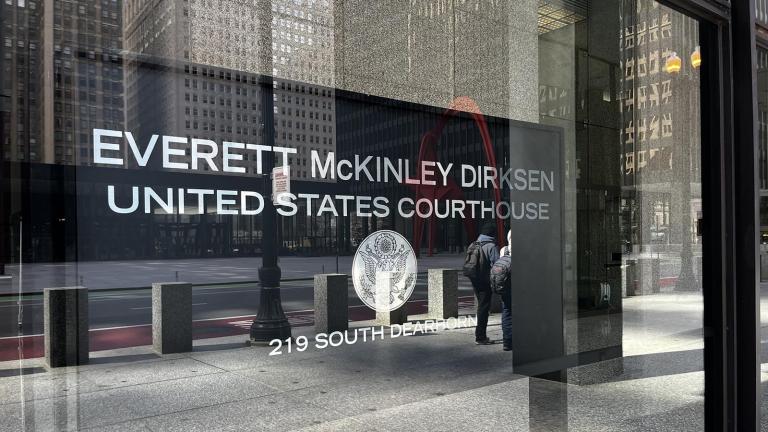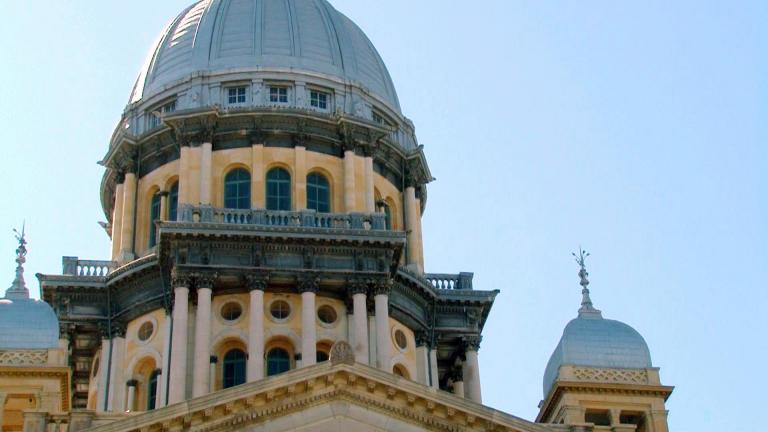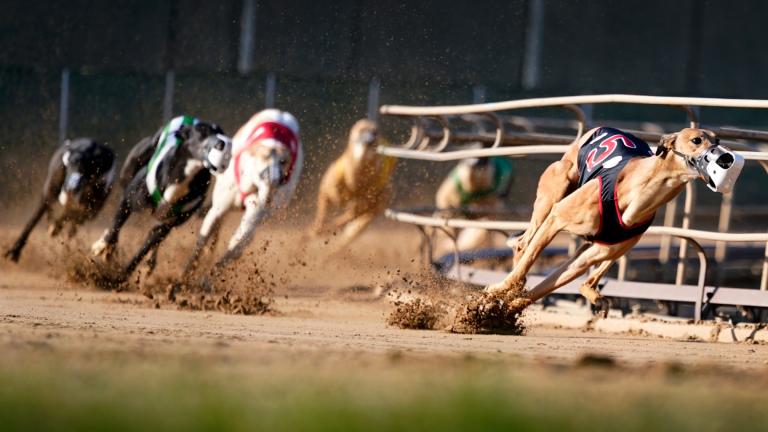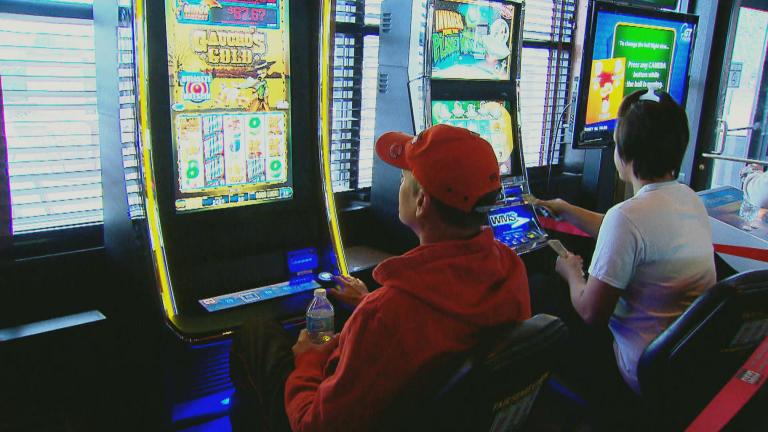Video: Mara Georges and Suzanne Leckert join “Chicago Tonight” to discuss what’s at stake in the latest battle over sports betting. (Produced by Leslie Hurtado)
Supporters of a measure that would allow five of Chicago’s professional sports teams to let fans place bets at their home arenas and during games have doubled down and will try again Monday to advance the proposal amid concerns it could kneecap a Chicago casino.
News that a vote on the measure could come at a joint session of the City Council’s Zoning and License committees set for 1 p.m. Monday set off a furious round of lobbying behind the scenes at City Hall over the proposal to allow the Bears, Cubs, White Sox, Blackhawks and Sky to operate sportsbook operations on their home turf. The measure has Mayor Lori Lightfoot’s support.
In an interview on “Chicago Tonight” Thursday, Mara Georges, who served as the city’s top lawyer under former Mayor Richard M. Daley who now represents efforts to open sports betting lounges at Wrigley Field and the United Center, said an independent study commissioned by the city showed the operations would have no impact on the revenue set to be generated by a Chicago casino.
Sports betting lounges would improve the experience for fans at Wrigley Field, United Center, Wintrust Arena, Solider Field and Guaranteed Rate Field, Georges said.
Chicago billionaire and Rivers Casino Des Plaines operator Neil Bluhm, whose Rush Street Gaming submitted two separate bids to build a casino-resort in Chicago, is opposed to allowing sports betting at pro-sports stadiums.
Suzanne Leckert, an analyst with Convergence Strategy Group representing Bluhm, told “Chicago Tonight” that allowing sports betting operations in Chicago could reduce revenues at its casino by 8.6% by driving away younger gamblers.
Leckert said she could not say whether Bluhm would pull out of the bidding for a Chicago casino if the sports betting operations were approved.
“When we crunch the numbers, this potential loss in revenues makes a really tight proposition even tighter and it could make a Chicago (casino) license unviable,” Leckert said.
The study cited by Georges and city officials is not yet complete and cannot be released publicly, Lightfoot spokesperson Cesar Rodriguez told WTTW News on Thursday. That draft study was at the center of an abruptly adjourned hearing Tuesday, with several alderpeople saying they were frustrated they had not yet seen its findings.
In response to WTTW News’ inquiry, the mayor’s office released a three-slide PowerPoint presentation from real estate firm CBRE that found that sports betting generated 2.3% of overall gaming revenue and just 8.5% of all sports bets were placed in person.
The measure up for consideration would vote to allow the Bears, Cubs, White Sox, Blackhawks and Sky to operate sportsbook operations on their home turf and impose a 2% tax on gross revenues from sports betting. Those revenues are already subject to a 15% state tax and a 2% Cook County tax.
Allowing Chicago’s pro-sports teams to offer sports betting would add between $400,000 to $500,000 to Chicago’s coffers annually, according to an analysis presented by Connor Brashear, the chief of staff to chief financial officer Jennie Huang Bennett. The teams could realize gross revenues of $20 million to $25 million, according to the city study.
Ald. Pat Dowell (3rd Ward) called the city’s share of those revenues “paltry” and “peanuts,” joining several alderpeople in suggesting that was insufficient.
In-person sports betting operations in Chicago would be taxed at the sixth highest tax rate in the nation, according to the CBRE report.
The casino is expected to ring up $200 million in revenue for the city annually. Those funds are earmarked for Chicago’s underfunded police and fire pension funds.
In addition to the 2% tax on gross revenues, Chicago would charge venues an initial $50,000 license fee for a sports betting lounge, as well as $25,000 per year to renew that license. Independent firms could apply for licenses to operate sportsbooks at the venues for $10,000, renewable with an annual fee of $5,000, according to the proposal.
A permanent casino could open as soon as 2025 in Chicago, although slot machines could start ringing at O’Hare and Midway airports much sooner — with tentative plans for a temporary casino also in play.
Bluhm has proposed building a casino and resort in what is now McCormick Place’s Lakeside Center — once known as the convention center’s east building — or south of the Loop on vacant land along the Chicago River set to be redeveloped by Related Midwest as The 78.
With his close ties to Chicago’s political and economic leaders, Bluhm has long been perceived as the front-runner in the high-stakes craps game that will determine the future of Chicago’s casino.
Bally’s envisions building a $1.6 billion complex at either the Chicago Tribune Publishing Center, at Chicago Avenue and Halsted Street, or the McCormick Place Truck Marshaling Yard on the south side of the convention center, according to a statement from the firm.
Hard Rock International proposed building the casino and resort as part of the One Central project, which would build a mixed-use development over the Metra tracks south of Soldier Field.
Chicago officials have declined to allow bars and taverns to offer video poker for years, with many officials saying they did not want those machines to drain revenue from a future casino.
Lightfoot announced Nov. 17 she supported legalizing sports betting lounges at pro-sports stadiums despite Bluhm’s opposition and concern that it will hurt a casino.
That represents an about-face from May 2019, when Lightfoot urged state lawmakers not to allow Chicago’s professional sports teams to offer sports betting at their stadiums, saying at the time that provision has “the potential to undermine the viability of any Chicago-based casino through the diversion of customers and revenue from a casino.”
Lightfoot told reporters on Nov. 29 that she would not “allow something to move forward that felt like it was going to undermine that incredibly important opportunity” presented by a Chicago casino and said she relied on “facts and data” to reach that conclusion.






